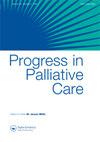Dealing with dying – progressing paramedics’ role in grief support
IF 0.8
Q4 PUBLIC, ENVIRONMENTAL & OCCUPATIONAL HEALTH
引用次数: 4
Abstract
Abstract Paramedics are frequently present at the death of patients and are in a position to provide grief support to family members who are suddenly bereaved, but existing education and system resources have failed to provide paramedics with the necessary tools to do so. Although the literature emphasizes the importance of providing grief training from initial education, through clinical placements and into continuing professional development opportunities, the current state across all health professions is a patchwork of elective, brief, and siloed opportunities. With new interprofessional partnerships developing between paramedicine and palliative care, there is a unique opportunity to better prepare paramedics to adequately participate in the death and dying process and address developing competency in grief support in a more strategic and integrated manner. We suggest employing a multi-faceted approach, focused on recruitment, initial and continuing education, and continued support in clinical practice. Importantly, paramedics will require support from interprofessional colleagues in palliative, grief and bereavement care to provide expertise in educational programs, clinical placements, and support at the patient's bedside. Now is the time to address grief support across the full continuum of paramedic practice to ensure paramedics are competent to support recently bereaved families.处理临终护理人员在悲痛支持中的作用
摘要医护人员经常出现在患者死亡时,并能够为突然失去亲人的家庭成员提供悲伤支持,但现有的教育和系统资源未能为医护人员提供必要的工具。尽管文献强调从最初的教育开始提供悲伤培训的重要性,通过临床实习和持续的专业发展机会,目前所有卫生专业的状况都是选择性的、短暂的和孤立的机会。随着护理人员和姑息治疗之间新的跨专业伙伴关系的发展,护理人员有了一个独特的机会,可以更好地为充分参与死亡和死亡过程做好准备,并以更具战略性和综合性的方式解决悲伤支持能力的培养问题。我们建议采用多方面的方法,重点是招聘、初始和继续教育,以及临床实践中的持续支持。重要的是,护理人员将需要姑息治疗、悲伤和丧亲护理领域的跨专业同事的支持,以提供教育项目、临床安置和患者床边支持方面的专业知识。现在是时候在整个护理实践中解决悲伤支持问题了,以确保护理人员有能力支持最近失去亲人的家庭。
本文章由计算机程序翻译,如有差异,请以英文原文为准。
求助全文
约1分钟内获得全文
求助全文
来源期刊

PROGRESS IN PALLIATIVE CARE
PUBLIC, ENVIRONMENTAL & OCCUPATIONAL HEALTH-
CiteScore
2.60
自引率
11.80%
发文量
24
期刊介绍:
Progress in Palliative Care is a peer reviewed, multidisciplinary journal with an international perspective. It provides a central point of reference for all members of the palliative care community: medical consultants, nurses, hospital support teams, home care teams, hospice directors and administrators, pain centre staff, social workers, chaplains, counsellors, information staff, paramedical staff and self-help groups. The emphasis of the journal is on the rapid exchange of information amongst those working in palliative care. Progress in Palliative Care embraces all aspects of the management of the problems of end-stage disease.
 求助内容:
求助内容: 应助结果提醒方式:
应助结果提醒方式:


